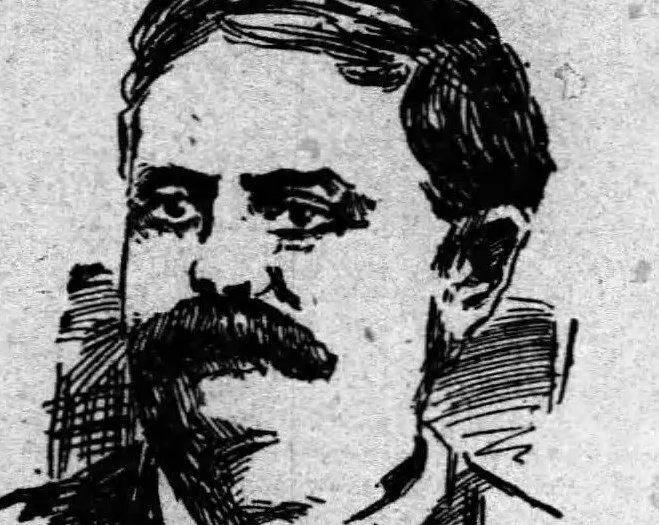
Contributing writer Brent Engel.
Political nominee chosen in unusual way
He could enchant or repel, intimidate or soothe, finagle or play fair.
The man who tossed the coin that decided the 1888 Missouri Seventh District Democratic congressional race was an inexplicable contradiction.
Nathaniel Craig “Nat” Dryden was the ultimate spin doctor, a cunning schemer who relished the thrill of verbal battle. Some thought he was a rogue who belonged in jail. Others believed him a sage who simply could have used a better moral compass.
Political mischief, heavy drinking and an addiction to morphine earned Dryden the title of “wickedest man in Missouri.” But even critics could not argue that sparks of genius flew when he entered a courtroom or a Democratic Party gathering.
“He is everywhere, noisy, waggish, good-natured, bantering and cheerful,” the Mexico Ledger wrote.
Biographer A.J.D. Stewart admitted that “his peculiarities, his characteristics, his strength and weaknesses comprise the subject of supreme interest.”
Considerable talents were established long before the 1888 campaign, when Dryden helped friend and Lincoln County attorney Richard Horton wage a nasty battle against Pike County Judge Elijah Robinson.
Born at Palmyra in 1849, Dryden was the son of Missouri Supreme Court Justice John Debos Sharp Dryden. The elder was a Virginia native who may have inspired his son’s rebellious tendencies.
The 1865 Missouri Constitution required Supreme Court justices and other elected officials to step down. When Dryden refused Gov. Thomas Fletcher’s order to leave office, he was forcibly removed and charged with disturbing the peace.
The St. Louis Republic spoke for many papers when it called the action “a most scandalous and indecent breach” of the law. The case was dismissed when prosecutors did not show up for a court hearing. Dryden returned to private practice in St. Louis with another son, John.
First in his class upon graduation from Washington University in 1870, Nat Dryden initially made his living as a prosecutor in Warren and Lincoln counties.
Though enjoying camaraderie with other attorneys, he remained fiercely independent. In 1872, Dryden joked that he would not be part of any clique unless it was “sent forth in the ravings of some poor, silly lunatic.”
Statewide recognition came on Nov. 24, 1875, when Dryden helped win the murder conviction of William Foster in Warren County.
Foster denied killing what newspapers unsympathetically called “an unknown colored man.” He claimed his confession was bogus and had a message for Dryden.
“Well, if it will do him any good to see a poor, miserable wretch like me hung, he can enjoy it,” said Foster, who went to the gallows on June 19, 1876. It was thought to be the first time a white Missourian was put to death for killing a black man.
Around that time, Dryden moved from Warrenton to Troy. “He is a lawyer of recognized ability, a genial social gentleman, and we heartily welcome him in our midst,” the Troy Free Press said.
The St. Charles Cosmos mused that Dryden would be busy.
“There is a shooting scrape every morning regularly, and occasionally a murderous matinee,” the paper said of Lincoln County.
It wasn’t that bad, but there were plenty of cases to prosecute. Among those he put away were Henry Rieke, who savagely beat to death his wife, Eliza, and Meredith Waters, who shot and killed Mary Ellen Callaway after she spurned his advances.
Eventually, Dryden found he got more satisfaction from defending suspects.
“Such was the depth and feeling of his sympathy that the accused’s own mother could not have been more sensitive to his client’s danger than was the attorney,” Stewart wrote.
In 1877, Dryden needed legal assistance himself when he shot federal revenue agent Ferdinand Meyer in Warrenton. Meyer, who survived, claimed Dryden had insulted him. Dryden denied the charge, pleaded self-defense and was acquitted.
“The liveried popinjays of tyranny can no longer run rough-shod over our citizens, thank Providence,” the Palmyra Spectator wrote of the verdict.
By the time of the 1888 congressional race, Dryden was a state and national Democrat Party leader – a behind-the-scenes fixer whose influence was unmistakable.
“If you think Nat Dryden isn’t a power in a convention, just go in without him or have him against you,” the Clarksville Sentinel warned.
Next time: The “flip-penny fiasco.”
CUTLINE FOR PHOTO:
A drawing of Nat Dryden.